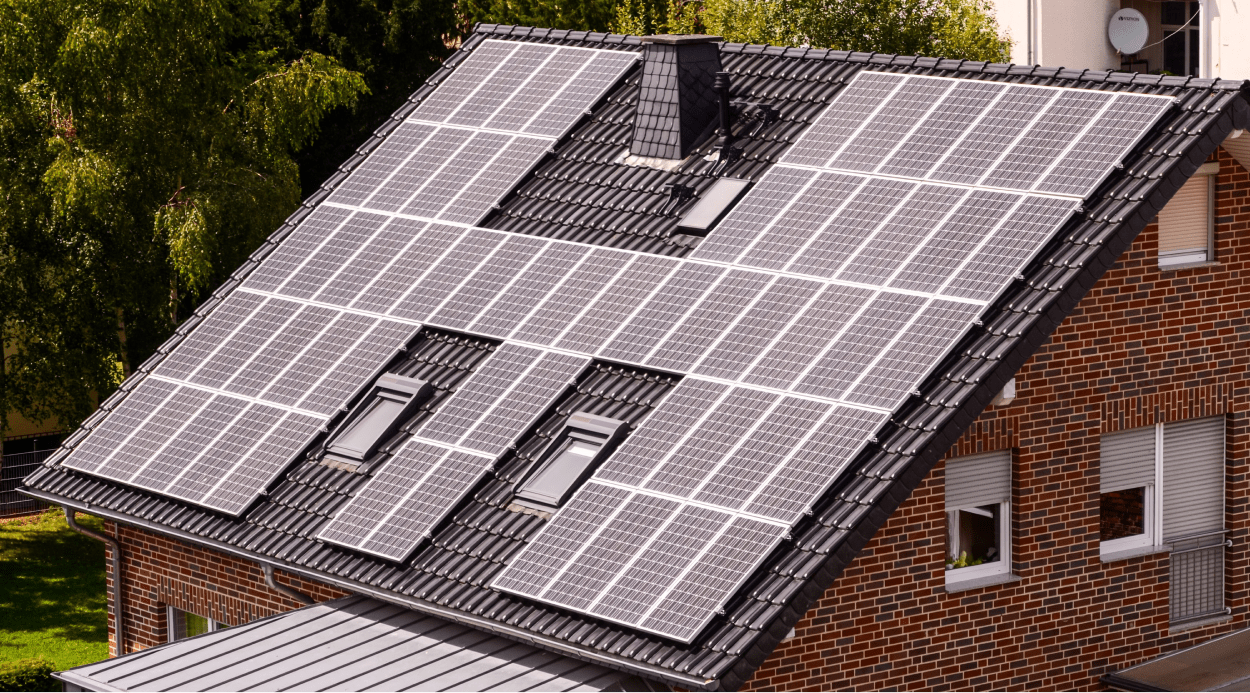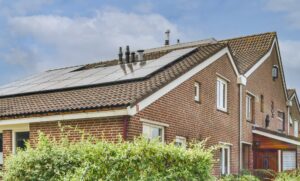
If you’ve started looking into solar panels, one of the first questions that probably comes to mind is: how many do I actually need to power my home?
The answer depends on a few key things such as how much electricity you use, how much space you’ve got on your roof, and the type of panels you choose.
At Bolton Electrical Services, we design and install solar panel systems across Bolton and the North West, helping homeowners and businesses find the perfect setup to lower bills, cut carbon emissions, and make the most of renewable energy.
General Guide to Solar Panel Numbers
| Home Type | Annual Energy Use (kWh) | Recommended System Size (kW) | Approx. No. of Panels | Roof Space Needed |
|---|---|---|---|---|
| 1–2 Bed Flat / Small Home | 2,000–3,000 | 2.5–3 | 6–8 | 15–20m² |
| 3–4 Bed Home | 3,500–5,000 | 4–6 | 10–14 | 25–30m² |
| Large Home / Small Business | 5,000+ – 8,000+ | 6–10+ | 15–20+ | 35m²+ |
Please note, the table above is a general guide. For an accurate design specific to your property, please speak with our team of experts.
Example Setups for UK Homes
Every home’s energy use is different, but here’s a general guide to show how many panels you might need based on property size and annual electricity consumption.
Small Home or Flat (1–2 Bedrooms)
If your yearly usage is around 2,000–3,000 kWh, a 2.5–3kW system will usually do the job. That’s roughly 6–8 panels, needing about 15–20m² of roof space.
Medium Home (3–4 Bedrooms)
An average family home using 3,500–5,000 kWh a year would typically need a 4–6kW system, made up of around 10–14 panels.
You’ll need approximately 25–30m² of roof space to fit them comfortably.
Large Home or Business
For properties using 5,000–8,000+ kWh a year, you’re looking at 15–20+ panels in a 6–10kW+ system.
These setups are perfect if you also plan to add battery storage or EV charging in future.

What Affects How Many Solar Panels You Need?
1. Your Energy Usage
The biggest factor in deciding how many solar panels you need is how much electricity you use. The more energy your home or business consumes, the larger your solar system needs to be.
Electricity use is measured in kilowatt-hours (kWh). To give you a rough idea:
- A 1–2 bedroom home or flat usually uses around 2,000–3,000 kWh per year.
- A typical 3–4 bedroom house averages 3,500–5,000 kWh.
- A larger home or one with high energy use (for example, electric heating or EV charging) can easily exceed 5,000 kWh a year.
If you’re not sure what your usage is, check your latest energy bill. It’ll show your annual kWh total. Once you know that number, it’s much easier to calculate how many solar panels you’ll need to meet your needs.
2. System Size and Solar Panel Output
The size of your solar system, measured in kilowatts (kW), determines how much electricity it can generate. The higher the total kW, the more panels you’ll need.
Most modern solar panels in the UK produce between 350W and 450W each, depending on their efficiency and brand.
To put that into perspective, a 4kW solar system would typically need around 10–12 panels, while a 5kW system would need roughly 12–14 panels. Larger systems, such as a 6kW setup, usually use 14–16 panels.
The right solar panel size for your property depends on how much roof space you have and how much energy you want to generate.
3. Roof Space and Orientation
Your roof size and direction play a big role in how many solar panels you can install, and how efficiently they’ll perform.
Most standard solar panels are around 1.7m x 1m in size, so a typical 4kW system (around 10–12 panels) needs roughly 20m² of clear roof space. Larger systems, such as 5kW or 6kW, will need a bit more room.
Orientation matters too. A south-facing roof is ideal because it captures the most sunlight throughout the day.
East- and west-facing roofs still perform very well in the UK and only lose a small amount of generation, while north-facing roofs are less efficient but can still work with the right setup and inverter.
If your roof space is limited, don’t worry. Higher-efficiency panels can generate more power using fewer units. At Bolton Electrical Services, we can assess your roof and recommend the best configuration to get the most from your available space.
4. Location and Sunlight Levels
Where you live in the UK can make a small difference to how much solar energy your panels produce. Areas in the South and Midlands tend to get slightly more sunlight hours each year than the far North, but the gap isn’t as big as many people think.
Modern solar panels are designed to work efficiently even in cloudy or low-light conditions, which means they still perform well right across the UK. Whether you’re in Bolton, Manchester, or further north, your panels will continue generating clean electricity all year round.
5. Adding Battery Storage
Adding a solar battery can make your solar system far more efficient. Instead of sending unused power back to the grid, a battery lets you store the electricity your panels generate during the day and use it later, like in the evening or during cloudy weather.
This means even a smaller solar setup can go further, helping you reduce your reliance on the grid and make the most of every unit of energy your panels produce.
At Bolton Electrical Services, we can help you choose the right battery size to match your system and energy habits. You can learn more about how batteries work on our Solar Panel Battery Storage page.
Is My Roof Suitable for Solar Panels?
Before deciding how many panels you’ll need, it’s worth checking that your roof is a good fit. The direction, angle, and overall condition of your roof all play a big part in how well your system performs.
South-facing roofs tend to work best, but east- and west-facing roofs can still generate plenty of power with the right setup.
If you’re not sure whether your roof is suitable, we’ve covered this in detail in our How to Determine if Your Roof Is Suitable for Solar Panels guide.
How Bolton Electrical Calculates the Right System Size
At Bolton Electrical Services, every installation starts with a free consultation and site survey, where our team looks closely at your roof, shading, and energy use.
We’ll analyse your electricity consumption, assess how much sunlight your roof receives throughout the year, and design a system that’s perfectly matched to your needs.
You’ll also receive an accurate performance estimate, so you know exactly what kind of energy savings to expect before installation begins.
Our goal is simple: to design solar systems that deliver maximum efficiency, value, and return on investment for every customer.
Frequently Asked Questions (FAQs)
How many solar panels do I need to power a house in the UK?
Most UK homes need between 10–14 panels (a 4–6kW system), depending on your energy usage and available roof space.
How do I calculate how many solar panels I need?
A quick way is to divide your annual electricity use (in kWh) by the expected output of each panel, usually around 350–400 kWh per year per panel.
Can I power my entire house with solar panels?
In many cases with the right system size and added battery storage, you can cover almost all of your household’s energy needs and reduce grid reliance.
What size solar system do I need for a 3-bedroom house?
Most 3-bedroom homes need a 4–5kW system, which works out at roughly 10–12 panels.
How big are solar panels?
Most panels are about 1.6 metres by 1 metre and weigh around 20 kilograms each, though exact sizes vary slightly by brand and wattage.
Do solar panels work on cloudy days?
Yes. While performance is reduced compared to sunny conditions, modern solar panels still generate power even in overcast weather.
